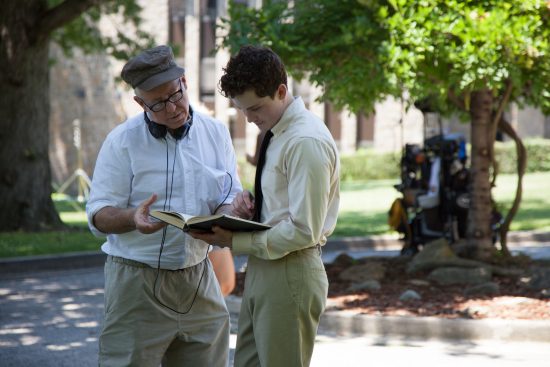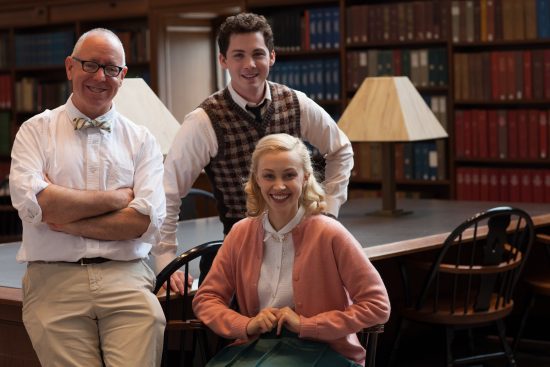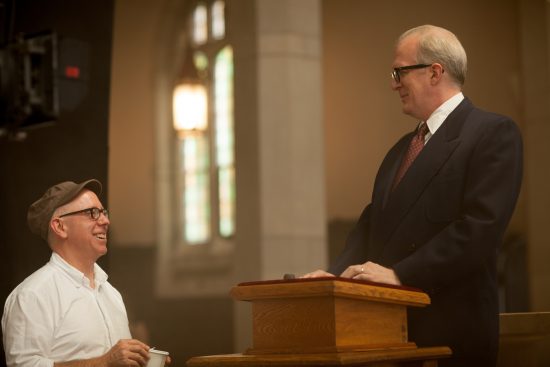James Schamus talks about his directorial debut, Indignation
Right before meeting Mr. James Schamus, I got overwhelmed with the eponymous “never meet your heroes” myth. After all, it’s hard not to feel a tad bit intimidated when you’re about to interview the multi-Oscar nominated and multi-award winning producer of Brokeback Mountain, Happiness, Sense and Sensibility, and also writer of The Ice Storm and Crouching Tiger, Hidden Dragon among many other Ang Lee movies. Yet, within a minute of chatting with this brilliant Hollywood legend about his directorial debut, Indignation (read my review)- which he himself adapted from Philip Roth’s late novel – I experienced an internal sigh of relief, courtesy of his affable, lovely and extremely entertaining personality.
Upon starting our conversation with the reason why he decided to transition into directing as a 57 year-old man with the kind of illustrious career he has built so far, he surprised me by flat out saying that for starters, he had been fired from his studio job (as CEO of Focus Features, the company he co-founded and turned into the revered speciality box office machine that oversaw and distributed among others Lost In Translation and Eternal Sunshine Of The Spotless Mind).
“I was unemployed and that’s a lovely place to be sometimes. At that point I had an opportunity to say at my age: let’s try something new! We were able to do it inexpensively enough, even though it was still a scramble to get the budget, which is always the case for independent films. The stress wasn’t that extraordinary. The odds of failure were still great but so what? Never before had I flirted with the idea of directing. Maybe it was a lack of imagination but it was also that for 30 years I was having a blast writing scripts, producing for Ang Lee and running a movie studio.”
Indignation follows Jewish college student Marcus Messner (Logan Lerman) who leaves his family in Newark to go study in Ohio, thanks to a scholarship that allows him to avoid the military draft during the Korean War. Studious and wise-beyond-his-years, albeit inexperienced in life and still innocent on many levels, Marcus is bound to come of age when he falls in love with the beautiful and enigmatic Olivia Hutton (Sarah Gadon) and when he clashes with the system, represented by the University’s Dean (Tracy Letts).
Schamus thinks that a filmmaker doesn’t necessarily need a personal connection with the material in order to choose a project. “If the story is good, that’s already your connection and you’re somehow taken with it. Obviously, the protagonist is an extremely attractive, articulate, intelligent, young Jewish guy so clearly I completely identify with him [laughs], at least in that kind of projected narcissism that drives many directors. But in another way, there’s a negative charge to the book that you can read precisely in the title, ‘Indignation’, a sense of protest, of anger that ran as an undercurrent to the story and that really appealed to me. I think that Roth’s novel, although the tone is very elegiac and wistful at times, being one of his final books towards the end of his career, it is also very much a protest against not just what the world was in 1951 when he arrived at University but what it clearly is reproducing itself as again now.”
Discussing how today’s youth compares to their 50s counterpart, he underlines that “on one level maybe these young generations have been less involved or politically active but since when is the job of young people to save the world that’s been screwed up by everybody who came before them? That said, we’re on the verge of probably electing a Berlusconi in the United States [This interview eerily took place a few days prior to the US presidential election] but one who in three minutes can destroy the entire world by pressing a button. If you’re not a little nervous about it, there’s probably something wrong with you.”
Among his many accolades, the newly minted director is also Professor of Professional Practice at Columbia University’s School of the Arts, where he teaches film history and theory: “It’s clear how I found in these characters oddly prescient emotional and intellectual lives that resonated very much with what I was seeing with my students at Columbia University now. That said, the manner in which one registers that protest is often determined by the tools one has on their side, and these young people in 1951, in the environment they were in, had a very specific set of tools which often were as much as self-harming as they were constructive. Olivia Hutton for instance, who is played by Sarah Gadon, is somebody who is raising an existential cry against this patriarchy that she’s living in. However, the process by which she can construct her protest more often involves her own sacrifice than it does anybody else’s – and that happens a lot with young people.”
Speaking of the hardships of adapting Roth for the screen and the inevitable choices to make in the process, Schamus notes how his choices weren’t just on a budgetary level: “I basically fondled the entire experience of the novel into the central story of the main character and once you whittle away the margins and you focus on that story, there’s a certain clarity that comes and that allows for a reduction of budgetary demands but there’s also an emotional clarity that was needed for the film to find its own path away from the book onto the screen. We needed a frame and the book is itself a frame. The voice in which the story is told in the book is a frame but you don’t’ have that in cinema, so I really wanted to make sure there was something that let the audience know at the end of the story that there is a residue that somehow survived in the universe and that we can connect with. The book does a great job of that but it does it with means that are only available to a great novelist, not to a beginning filmmaker.”
Given his long-time experience as a major producer and studio mogul, I asked Schamus whether he was nervous at all going into this new territory and how the experience compared to his career so far. “You can be nervous about anything. I could’ve made a kids’ movie with sock puppets based on a young adult novel that nobody had read and I’d still be nervous. Of course all of my previous experience was great but at the end of the day you have to jump off the ledge and just do something very different. But it’s fun taking the leap, so I tried in many ways not to let my past inform too much what I was doing when I was directing. They are very different jobs and you have to think differently. I got a little bit of advice here and there from Ang [Lee] of course, since we hang out a lot, but I actually made an effort not to get too much advice because everybody does it his or her own way. At a certain point you have to understand that if you’re going to get the job done the right way you actually have to make it up as you go along for yourself, in particular working with actors, because every director is different.”
On the pivotal and quasi epic stand off scene between Marcus (Logan Lerman) and Dean Caudwell (Tracy Letts), which is probably the longest yet most compelling dialogue-heavy scene you’ll see on the screen this year, Schamus has no doubts: “It was difficult but it was a fun challenge. There was no reference point for me to follow. I came up with a lot of, I’d say protocols almost, and structures that I tried to embed into the making of and the finishing of the scene that gave a kind of architecture to the experience. It’s not just about covering the scene with two people talking. Everything, from the way in which the camera angles work from the beginning to the end and who’s in the centre of the frame and all that stuff, I sketched out pretty much in detail, although you always change things as you go along – like the way people move and touch each other and what those gestures are echoing in other parts of the film. All those things are there in the scene and then from time to time I used to remind my actors that there are other things going on besides what they’re saying. Literally it is a life or death scene. There is death unfolding in it. But they don’t know it, the audience doesn’t know it but I do know it, so I’m using that and I’m actually charting ‘watching a death’. There were lots of other things that we did to structure it and give it a sense of cohesion and coherence for the audience.”
Our allotted time flies by and before parting ways I can’t help but address Schamus the Professor and ask for a piece of career advice on my screenwriting aspirations to wrap up our lovely conversation and he surprises me: “I must admit I hate the concept of giving advice because it’s like spiritual guidance, those kind of prophetic sentences that people say. I usually like to reply that the best advice you could ever get is the worst possible advice anybody could ever give you. My point is this: all advice is the same, the exact opposite is equally true.”
Indignation is in UK cinemas now via Vertigo Films.












